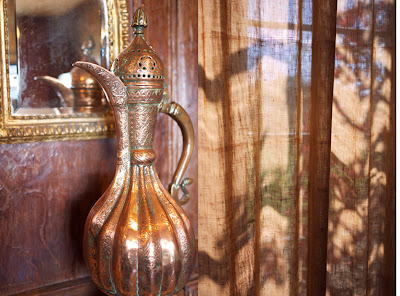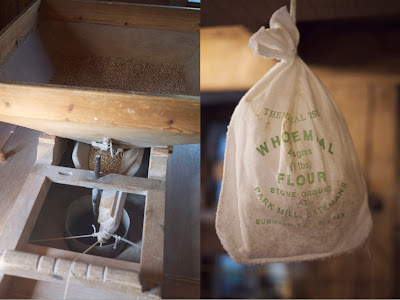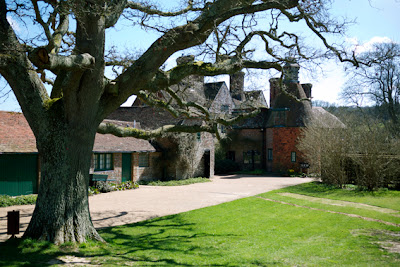Sunday, May 26, 2013
Wednesday, May 8, 2013
Bateman's: Jacobean house, home of Rudyard Kipling
A couple of weeks ago the National Trust held a special
weekend where you could visit many of their properties for free. My husband
decided we should visit Bateman’s the home of Rudyard Kipling. We set off on a
chilly spring day and travelled back in time to the place that had also
reconnected Kipling to the history of England and the “things that were
underneath” according to TS Eliot, “a deepening of the imperial into the
historical imagination". From striving outwards to looking within. A refuge from the trippers who besieged his Rottingdean
house and an escape from the reminders of his six year old daughter’s tragic
death from pneumonia, Bateman’s and the Dudwell valley would shape the second
half of his life’s work.
We strolled through the wildflower meadow that spreads
along the banks of the river Dudwell. Dappled sunlight shone on splashes of blue,
white, purple and yellow of the scillas, wood anemones, fritillaries and
daffodils that decorated the long, tangled grass. In the formal garden my son counted the
number of newts slowly appearing in the murky pond water with increasing excitement. Kipling had designed
this area himself making sure the pond had a shallow concrete bottom
so that a child or anyone else falling in would come to no harm. Since our
visit I have started reading Puck of Pook’s hill, a story written for his children
about a spirit, “the oldest Old Thing in England” who appears in the wild
garden to teach them about the history of England.
As Kipling was to write almost at the end of his life, with amazement and gratitude at what this landscape had given him:
As Kipling was to write almost at the end of his life, with amazement and gratitude at what this landscape had given him:
“The Old Things of our valley glided into every aspect of
our outdoor works. Earth, Air, Water and People had been – I saw it at last –
in full conspiracy to give me ten times as much as I could compass, even if I
wrote a complete history of England, as much as that might have touched or
reached our valley.”
The magic, the things that are underneath, the healing and wonder are
always there if you know where to look. It is the right of every human to experience
and must be protected for our future.
PUCK'S SONG
See you the ferny ride that steals
Into the oak-woods far?
0 that was whence they hewed the keels
That rolled to Trafalgar.
Into the oak-woods far?
0 that was whence they hewed the keels
That rolled to Trafalgar.
And mark you where the ivy clings
To Bayharn's mouldering walls?
0 there we cast the stout railings
That stand around St. Paul's.
To Bayharn's mouldering walls?
0 there we cast the stout railings
That stand around St. Paul's.
See you the dimpled track that runs
All hollow through the wheat?
0 that was where they hauled the guns
That smote King Philip's fleet.
All hollow through the wheat?
0 that was where they hauled the guns
That smote King Philip's fleet.
(Out of the Weald, the secret Weald,
Men sent in ancient years,
The horse-shoes red at Flodden Field,
The arrows at Poitiers!)
Men sent in ancient years,
The horse-shoes red at Flodden Field,
The arrows at Poitiers!)
See you our little mill that clacks,
So busy by the brook?
She has ground her corn and paid her tax
Ever since Domesday Book.
So busy by the brook?
She has ground her corn and paid her tax
Ever since Domesday Book.
See you our stilly woods of oak,
And the dread ditch beside?
0 that was where the Saxons broke
On the day that Harold died.
And the dread ditch beside?
0 that was where the Saxons broke
On the day that Harold died.
See you the windy levels spread
About the gates of Rye?
0 that was where the Northmen fled,
When Alfred's ships came by.
About the gates of Rye?
0 that was where the Northmen fled,
When Alfred's ships came by.
See you our pastures wide and lone,
Where the red oxen browse?
0 there was a City thronged and known,
Ere London boasted a house.
Where the red oxen browse?
0 there was a City thronged and known,
Ere London boasted a house.
And see you, after rain, the trace
Of mound and ditch and wall?
0 that was a Legion's camping-place,
When Caesar sailed from Gaul.
Of mound and ditch and wall?
0 that was a Legion's camping-place,
When Caesar sailed from Gaul.
And see you marks that show and fade,
Like shadows on the Downs?
0 they are the lines the Flint Men made,
To guard their wondrous towns.
Like shadows on the Downs?
0 they are the lines the Flint Men made,
To guard their wondrous towns.
Trackway and Camp and City lost,
Salt Marsh where now is corn-
Old Wars, old Peace, old Arts that cease,
And so was England born.
Salt Marsh where now is corn-
Old Wars, old Peace, old Arts that cease,
And so was England born.
She is not any common Earth,
Water or wood or air,
But Merlin's Isle of Gramarye,
Where you and I will fare.
Water or wood or air,
But Merlin's Isle of Gramarye,
Where you and I will fare.
Subscribe to:
Comments (Atom)











































